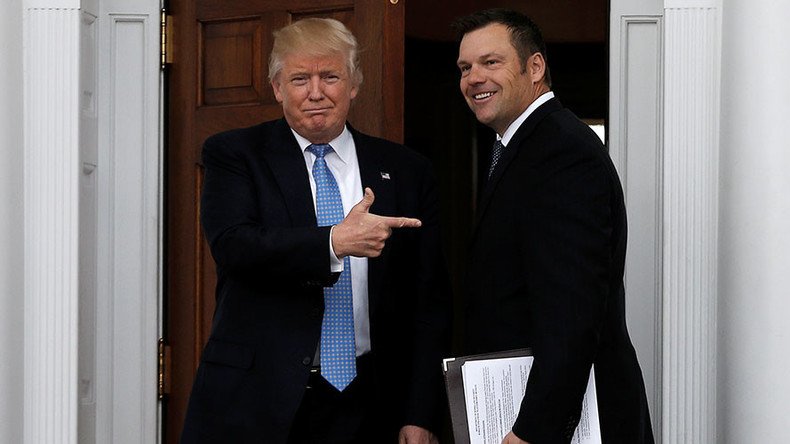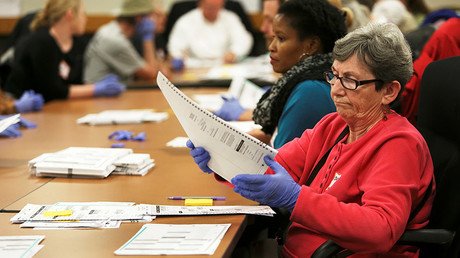White House denies that majority of states won't comply with Trump voter fraud probe

While multiple news outlets report that 44 states will not comply with President Donald Trump’s commission to investigate voter fraud, the White House insists that number is “fake news” in its defense of the probe’s goal.
According to a CNN inquiry of all 50 states, 44 states and the District of Columbia have refused to “provide certain types of voter information” to Trump’s Presidential Advisory Commission on Election Integrity.
The commission’s vice-chairman, Kris Kobach, who is also Kansas’ secretary of state, called the media reports “patently false” and “fake news” in a White House statement Wednesday.
“Despite media distortions and obstruction by a handful of state politicians, this bipartisan commission on election integrity will continue its work to gather the facts through public records requests to ensure the integrity of each American's vote because the public has a right to know,” Kobach said.
"Real news" -> 36 states have agreed or are considering providing publicly available voter data to @POTUS Election Integrity Commission. pic.twitter.com/qVUxH9rym9
— Vice President Pence (@VP) July 5, 2017
Twenty states have agreed to provide “publicly available information,” while another 16 are reviewing which information they can release under their state laws, according to Kobach’s statement.
In total, Kobach claims that 36 states “have either agreed or are considering participating with the Commission's work to ensure the integrity of the American electoral system.”
Last week, Kobach, sent a letter to all 50 states, requesting information on their voters in order to “increase the integrity of our election systems.”
The information requested by the commission included “the full first and last names of all registrants, middle names or initials if available, addresses, dates of birth, political party (if recorded in your state), last four digits of social security number if available, voter history (elections voted in) from 2006 onward, active/inactive status, cancelled status, information regarding any felony convictions, information regarding voter registration in another state, information regarding military status, and overseas citizen information,” according to a copy of the letter obtained by the Washington Post.
Kobach also told the states to be aware that any documents submitted to the commission would be made available to the public.
#TheBigPicture: Did Voter Suppression Doom Ossoff [VIDEO] https://t.co/LgXGEWqy8f@Thom_Hartmann@Greg_Palast
— RT America (@RT_America) June 23, 2017
In response, several secretaries of state have released statements, either refusing to provide any information to the commission or only agreeing to provide information that is already available through public records requests.
Some states have flat out refused to comply with the commission, including Maryland, where State Attorney General Brian Frosh called the commission’s request “repugnant” in a tweet on Monday, adding that it “appears designed only 2 intimidate voters and 2 indulge the President's fantasy that he won the popular vote.”
I find this request repugnant; appears designed only 2 intimidate voters and 2 indulge the President's fantasy that he won the popular vote.
— Brian Frosh (@BrianFrosh) July 3, 2017
Delaware Secretary of State Jeffrey Bullock said his state would not be “a party to this disingenuous and inappropriate campaign against one of the nation's foundational institutions,” according to a statement released Monday.
#Delaware will not provide voter information to White House commission https://t.co/GQVcLWFHRc
— DE Dept. of State (@DEDeptState) July 3, 2017
Mississippi Secretary of State Delbert Hosemann told the commission to “go jump in the Gulf of Mexico,” according to a statement released last Friday.
Louisiana Secretary of State Tom Schedler accused the commission of “playing politics” and told them they could only “purchase the limited public information available by law, to any candidate running for office. That's it,” according to a statement released on Monday.
Schedler denies massive data request from Presidential Commission on Election Integrity https://t.co/pAXc3cUc10#GeauxVote
— La. Sec. of State (@Louisiana_sos) July 3, 2017
Other states have said that they cannot comply with the request, because they have laws protecting voter information.
Indiana Secretary of State Connie Lawson, a Republican, released a statement on Twitter Monday, saying state laws do not permit her to provide the personal information requested by Kobach.
"Under Indiana public records laws, certain voter info is available to the public, the media and any other person who requested the information for non-commercial purposes. The information publicly available is name, address and congressional district assignment,” Lawson’s statement said.
My statement on the CEI's request for voter information: pic.twitter.com/46vECNBtkf
— Connie Lawson (@SecretaryLawson) June 30, 2017
Even Kobach’s own state of Kansas said they would only share "publicly available" information with the commission.
"Any person in Kansas can obtain it. It is the basic information – name, address, etc. – not the sensitive information like last four SSN. That information is not publicly available, and therefore it is not part of the request,” Kobach's spokeswoman Samantha Poetter told CNN Friday.
Kansas is sending requested publicly available data to Presidential Commission on Election Integrity. Reports saying otherwise are #FakeNewshttps://t.co/sBtvos8i1b
— Kris W. Kobach (@KrisKobach1787) July 5, 2017













